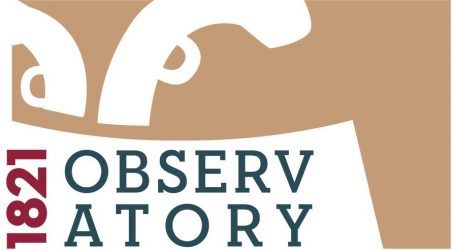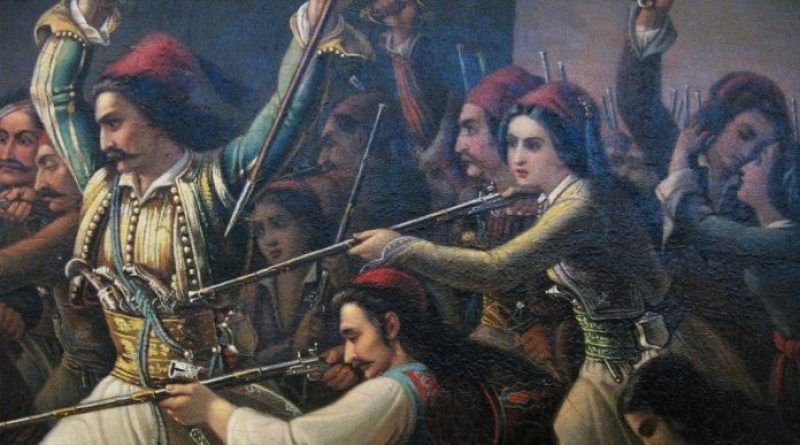The Women of the Revolution
A special and relatively unknown theme that emerged from the events marking the bicentenary of the Greek Revolution is the contribution and role of women in the national liberation struggle of 1821. Prominent and invisible heroines helped in various ways in the preparation of the revolution, and without their contribution, the struggle would have been uneven. Their multifaceted contribution to the struggle for independence proved to be very important in the pre-revolutionary period.
Various institutions such as municipalities, associations, institutions[1] and libraries honoured the women of the revolution by organising bicentenary events, speeches, exhibitions,[2] conferences and book presentations for young and old. For example, the municipalities of Volvi (Organisation of Culture, Sports and Environment) and Pavlou Mela (Department of Culture), the Messiniaki Amfiktyonia association and the Diocese of Veria, Naoussa and Kampania organised events dedicated to the largely unknown contribution of women to the national struggle:[3] “The contribution of women in the preparation and completion of the Greek revolution of 1821”, “Women in the revolution of 1821”,[4] “The participation of women in the Greek Revolution of 1821 and the echo of their action: Demonstration of forms of practical equivalence of women with men. The Nurses of feminism”, and “The contribution of women in the struggles of 1821”.
The aim of all the above events was to emphasise female heroism, the contribution and the position of women, with multidimensional personalities that combine many different roles.[5] These are women who were victims of the war. At the same time, however, there were the weakest links in the conflict and, for this reason, few dealt with them. They transported materials, built fortifications, cared for the sick, cultivated the land.
The position of women after the revolution is also presented. It was different, just as the experiences of woman in the city was different from those of the countryside.[6] In particular, events look at female figures from all over Greece, such as Souli,[7] Naoussa, Mani and Rumelia,[8] their place in the male-dominated society and their difficult daily life. Most of them were militants, while some intellectuals were initiated into the Philiki Etaireia, such as the Phanariot women. The latter addressed letters to women from abroad (America, England, France) seeking support and encouraging philhellenism among women. They were feminist prototypes, led the army and the fleet, and proved worthy of their male comrades-in-arms.[9] They inspired many artists, painters and several folk songs were written about them.
Women from Souli, such as Despo Botsi, Moscho Tzavella, Eleni and Chrysoula Botsari and Haido Giannaki. Women from Messolongi and Mani who participated in battles and sieges, women from Veria and Naoussa such as Karatasina and Zafeiraki. Heroines who became known as Bouboulina, Mavrogenous, Visviki. In addition to their active role in the war, they organised troops, financially assisted in the struggle, in the care of the sick and in the supply of the fighters. It is a general finding that the war was not about women; it is a matter for men and that the revolution created little hope for the position of women, as they themselves did not save their thoughts and feelings, being in most cases illiterate. Only later in the 19th century did women produce written works, and then only in cases where they came from important families. Travellers also commented on their lives, noting their hard daily life.
In folk songs, they are described as models of action and behaviour. Thus, reference is made to anonymous women[10] from Messolonghi and Mani but also to surnamed ones, mainly from noble families. After the establishment of the new state, the majority of women were excluded from political life, while their exclusion from voting was self-evident.
An impressive number of events took place on International Women’s Day to honour and highlight the important role of women. The year 2021 was a symbolic one, an important anniversary that became the occasion for reflection and reflection on gender equality. The events presented heroic women figures who contributed in various ways to the struggle, underlining that years would pass before women would actually gain power. At the same time, it was noted that the women of the revolution share many common characteristics with the modern rural women of today. The subject of women’s contribution to the Greek Revolution needs more deepening and research and has already aroused the interest of an increasing number of young historians.
Nikoleta Koutsomichali, PhD candidate, Departement History and Ethnology, Democritus University of Thrace
[1] “Συνέδριο ‘Γυναίκες στην Ελλάδα: από την Επανάσταση έως πέρα από το 2021’” [Conference: “Women in Greece: from the revolution to beyond 2021], Protovoulia 1821–2021, https://www.protovoulia21.gr/synedrio-gynaikes-stin-ellada-apo-tin-epanastasi-eos-pera-apo-to-2021/
[2] “Η Γυναίκα στην Επανάσταση του 1821”: Στο Ίδρυμα Θεοχαράκη από τις 23 Μαρτίου [“Woman in the 1821 Revolution”: At the Theocharakis Foundation from 23 March 23], Naftemporiki, 24 March 2021, https://www.naftemporiki.gr/story/1703721/i-gunaika-stin-epanastasi-tou-1821.
[3] Anna Karamanou, Η ειρηνική εξέγερση των θηλυκών Sapiens 1821–2021 [The peaceful uprising of women sapiens, 1821–2021] (Athens: Armos, 2021).
[4] Stavros Malagkoniaris, “Οι γυναίκες στην Επανάσταση του 1821” [The women of the 1821 Revolution], Efimerida ton Syntakton, 7 March 2021, https://www.efsyn.gr/nisides/284469_oi-gynaikes-stin-epanastasi-toy-1821.
[5] Vasiliki Lazou, Γυναίκες και Επανάσταση 1821: Από τον οθωμανικό κόσμο στο ελεύθερο ελληνικό κράτος [Women and the 1821 Revolution: From the Ottoman world to the free Greek state] (Athens: Dioptra, 2021).
[6] Giota Angelopoulou, Επανάσταση 1821: Γένους Θηλυκού [1821 Revolution: The female race] (Athens: Angelaki, 2021).
[7] Niki Baktouli, “Ελληνική Επανάσταση: Οι διάσημες ηρωίδες του 1821. Aπό την Μπουμπουλίνα ως τις Σουλιώτισσες” [Greek Revolution: The famous heroines of 1821. From Bouboulina to the Souliot women], Ladylike, 25 March 2021, https://www.ladylike.gr/afierwmata/elliniki-epanastasi-oi-diasimes-iroides-tou-1821-apo-tin-boumpoulina-os-tis-souliotisses/.
[8] Lamprini Koufaki, Η συμβολή των γυναικών της Ρούμελης στην Επανάσταση του 1821 [The contribution of Rumeliot women in the 1821 Revolution] (Athens: self pub., 2021).
[9] Foteini Englezou et al., Γυναικείες Φιγούρες της Οθωμανικής Περιόδου και της Ελληνικής Επανάστασης: Η Ρητορική του Φύλου και του Αγώνα [Female figures of the Ottoman period and the Greek Revolution: The Rhetoric of gender and struggle] (Athens: Hellenic Institute of Rhetorical and Communication Studies, 2022), https://www.rhetoricinstitute.edu.gr/wp-content/uploads/2022/02/%CE%99%CE%A1%CE%95%CE%A3%CE%95.-%CE%A6.-%CE%95%CE%93%CE%93%CE%9B%CE%95%CE%96%CE%9F%CE%A5.-%CE%93%CE%A5%CE%9D%CE%91%CE%99%CE%9A%CE%95%CE%99%CE%95%CE%A3-%CE%A6%CE%99%CE%93%CE%9F%CE%A5%CE%A1%CE%95%CE%A3.pdf
[10] Chryssa Mardaki, Ελέγκω: Αν Ήσουν Γυναίκα στην Ελληνική Επανάσταση [Elego: If you were a woman in the Greek Revolution] (Athens: Mediterra, 2021).

